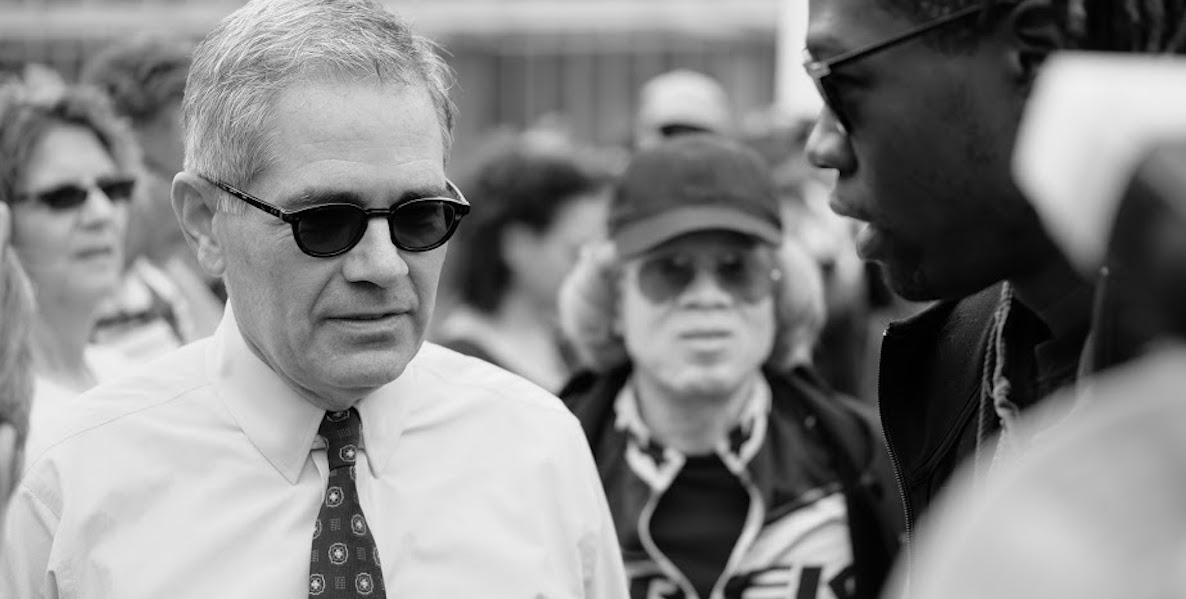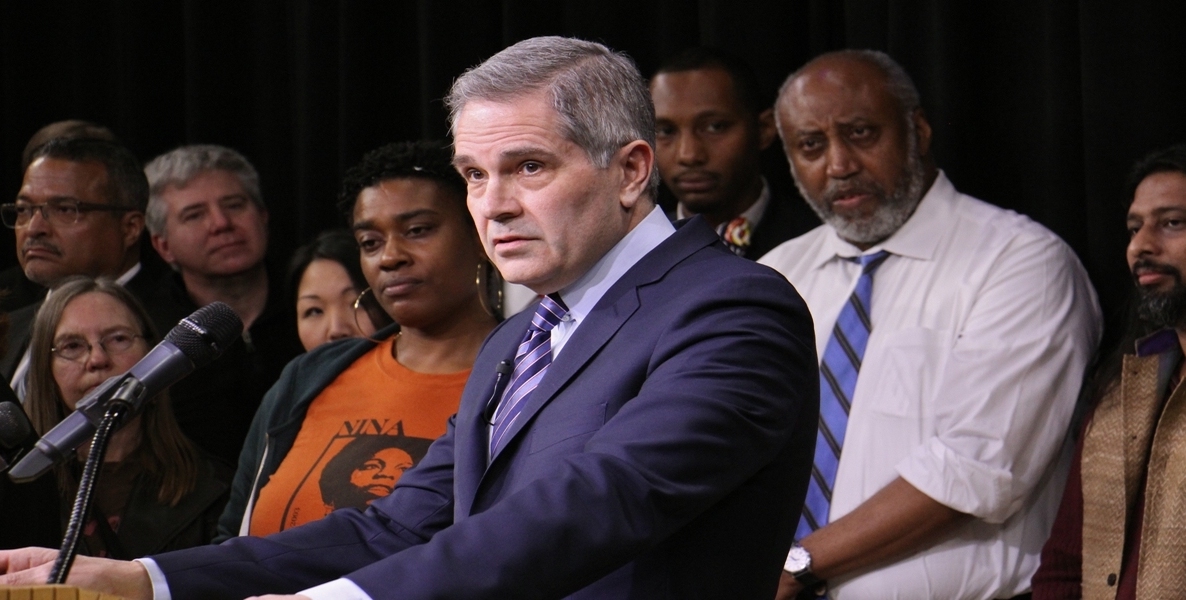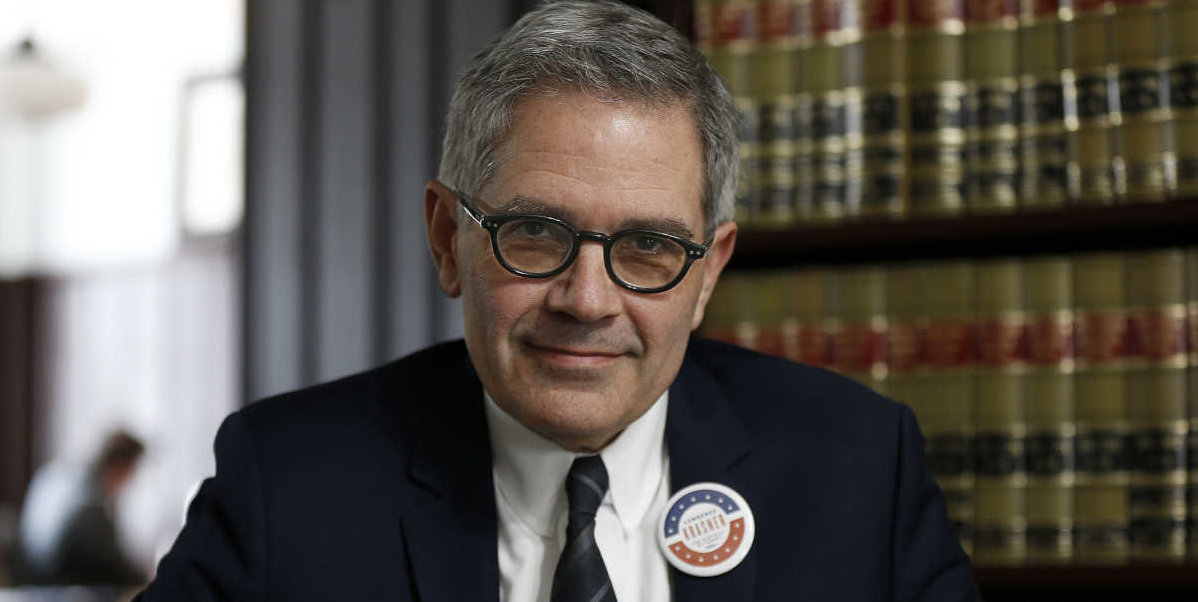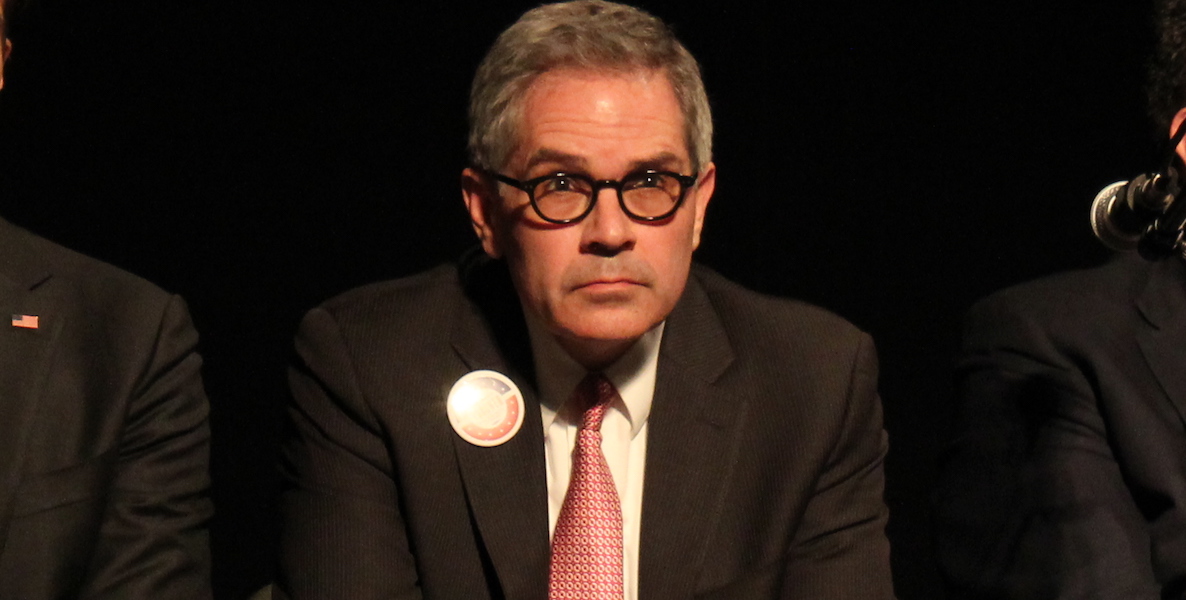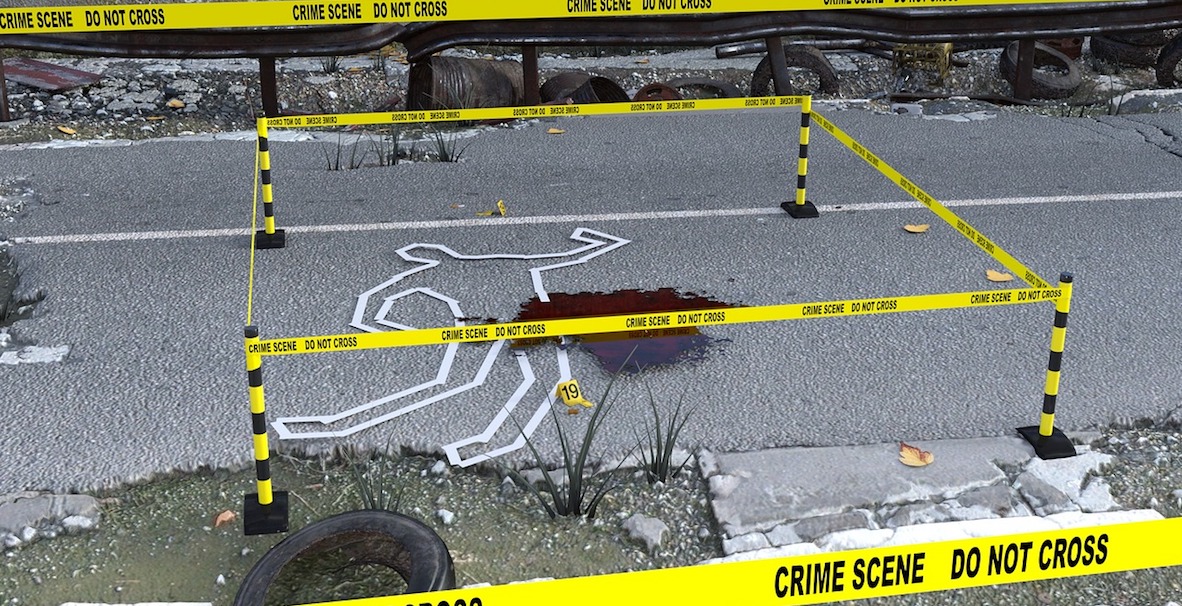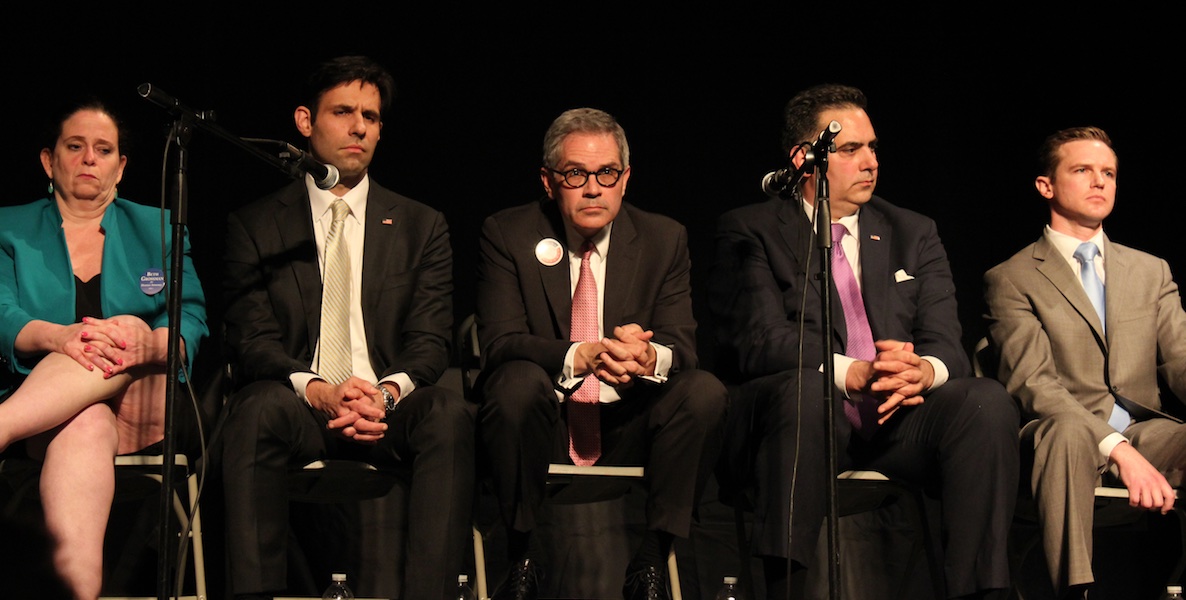So, we’ve just about made it through another DA’s race, during which I’ve been waiting for some transformative, catalyzing event to shake the campaign awake. Elsewhere, owing to the way we in the media tend to disproportionately value white lives, such catalyzing events have often involved a white homicide victim, causing a city’s powers that be to suddenly gasp and experience en masse a “there but for the grace of God go me and mine” moment.
Be Part of the Solution
Become a Citizen member.In 1990 in New York City, that case was the Midtown subway murder of 22-year-old Brian Watkins, a tourist from Provo, Utah, who was stabbed to death while trying to protect his parents from a mugging. The murder of Watkins changed the city’s zeitgeist, ushering into office Rudy Giuliani’s tough-on-crime reforms, which would go on to do the unthinkable and pretty much eradicate violent crime in the city, only to engender its own backlash owing to what many saw as the ensuing brutal tactics of police.
Twice during this DAs race, I thought we might have our own Watkins-like moment. When Spring Garden community activist Gerard Grandzol was executed in broad daylight in front of his two-year-old daughter, I thought maybe it would wake us up to the epidemic on our streets and change the campaign talking points by resetting the public agenda. No such luck; the rapidity with which the civic conversation changes now—on to the next click—means hardly anything sticks for more than a day or two. Likewise, when two South Philadelphia 16-year-olds were recently murdered—and gunshots sprayed the home of the suspected shooter—I thought, surely this will focus the debate on our homicide epidemic?
Not quite. The story received its share of coverage, of course, but the conversation it engendered was mostly of the clucking, “What a shame” kind —as opposed to jumpstarting what we need: A citywide wakeup call. After all, as of last Thursday, our homicide rate—269 murders!—was up 14 percent over this time last year.
Yet, yesterday on Channel 6’s Inside Story, the two candidates for the top law enforcement job in the city talked mostly about criminal justice reform. When host Matt O’Donnell asked about the murder upsurge, Republican Beth Grossman—a veteran prosecutor—hit the usual notes of “investigating and prosecuting gun crimes.” Her opponent, Larry Krasner, a civil rights and defense attorney who has never prosecuted a case, mentioned “going after gun shops” before regurgitating his talking points, including pointing out that “Philadelphia is the most incarcerated of the 10 largest cities…This is what conservative Republican policies has done.”
Of course, Krasner’s point ignores the fact that conservative Republicans have had nothing to do with Philadelphia’s criminal justice policies, at least not since the 1940s. But the bigger point is that neither Krasner nor Grossman have offered a single new crime-fighting idea. In fact, it’s fair to say there has been no real debate between the candidates as to how to keep law-abiding, taxpaying Philadelphians safe. Hell, there has hardly been any debate at all, owing in part to the degree to which Grossman’s party has only lukewarmly supported her, since high turnout in Democrat-soaked Philadelphia only hurts Republican judicial candidates statewide.
When the police are an occupying force, they give rise to the very culture they say keeps them from solving crimes. Reading Ghettoside, you start to understand just how, when the police can’t keep neighborhoods safe, vigilantism and street justice start to make a perverted kind of sense.
In fact, Grossman and Krasner agree on many of Krasner’s criminal justice reforms. They only part company when it comes to tone, as when Krasner accuses the DA’s office of being a “coverup organization” that protects corrupt cops. No doubt, reforms such as eliminating cash bail and doing away with mandatory minimums are worthy of consideration, but should they take up so much of the campaign narrative while the body bags are piling up?
This campaign was a chance to have a more enlightened public conversation on crime and punishment, something smart and based on data, something that gets beyond the usual talking points of, on one side, the social justice warrior, and, on the other, the law and order traditionalist.
In her 2015 book Ghettoside: A True Story of Murder in America, reporter Jill Leovy does just that, and it ought to be required reading for anyone wading into criminal justice matters. Leovy’s gripping narrative, written with access to and empathy for actors on all sides of the drama, takes us deep into what she calls our “plague of murders”; African-American males, she tells us, are just 6 percent of the American population, but 40 percent of our murder victims.
It is Leovy’s contention that, yes, as Larry Krasner would have us believe, the ![]() criminal justice system in many of our cities is “oppressive”—but it’s also “inadequate.” That is to say, as she amply documents: Through tactics like stop-and-frisk, police are often an occupying force that focuses on control rather than—and this is key—being an innovative investigative force that actually solves murders.
criminal justice system in many of our cities is “oppressive”—but it’s also “inadequate.” That is to say, as she amply documents: Through tactics like stop-and-frisk, police are often an occupying force that focuses on control rather than—and this is key—being an innovative investigative force that actually solves murders.
“Forty years after the civil rights movement, impunity for the murder of black men remained America’s great, though mostly invisible, race problem,” she writes. “The institutions of criminal justice, so remorseless in other ways in an era of get-tough sentencing and ‘preventive policing’— like stop-and-frisk—remained feeble when it came to answering for the lives of black murder victims.”
The problem, Leovy argues, is not just the high homicide rate. It’s that so many people who commit murder are never punished. In the rough and tumble neighborhood of Los Angeles Leovy writes about, Watts, only 38 percent of murders with black male victims resulted in even an arrest. “Where the criminal justice system fails to respond vigorously to violent injury and death,” she writes, “homicide becomes endemic.”
Neither Krasner nor Grossman have offered a single new crime-fighting idea. In fact, it’s fair to say there has been no real debate between the candidates as to how to keep law-abiding, taxpaying Philadelphians safe.
Which brings us to Philadelphia, which rivals Watts when it comes to unsolved murders. Last year, the city’s homicide clearance rate dropped to its lowest in 15 years, the third consecutive year it has decreased. Of last year’s 277 murders, the clearance rate was just 45.4 percent.
Wouldn’t it be nice if a campaign to become our chief law enforcement officer![]() dug deep and engaged this question of whether our police are being tough and smart on the right things? Defenders of the police say that the decreasing homicide clearance rate is due to the rise of a “no snitching” culture on our streets; they can’t get cooperation. But Leovy’s reporting shows that, when the police are an occupying force, they give rise to the very culture they say keeps them from solving crimes. Reading Ghettoside, you start to understand just how, when the police can’t keep neighborhoods safe, vigilantism and street justice start to make a perverted kind of sense.
dug deep and engaged this question of whether our police are being tough and smart on the right things? Defenders of the police say that the decreasing homicide clearance rate is due to the rise of a “no snitching” culture on our streets; they can’t get cooperation. But Leovy’s reporting shows that, when the police are an occupying force, they give rise to the very culture they say keeps them from solving crimes. Reading Ghettoside, you start to understand just how, when the police can’t keep neighborhoods safe, vigilantism and street justice start to make a perverted kind of sense.
With just about every social dilemma we write about at The Citizen, we try and include coverage of possible solutions. I don’t have a clue how to improve policing, but maybe it begins with changing the nature of how we talk about violent crime. Maybe it requires our media, rather than just jerking awake when a white victim is slain, to regularly publicize the falling homicide clearance rate as often as we dutifully report who murdered whom yesterday. And maybe it includes law enforcement following the example of Upper Darby police chief Mike Chitwood, the most decorated cop in Philly history, and championing a new theory of policing—one that values emotional intelligence and deescalation skills.
Finally, maybe it demands that our candidates for District Attorney get beyond their pre-packaged talking points and address the interests of those beyond their ideological bases. Well, there’s always the next DAs race.
Header photo: Pixabay



